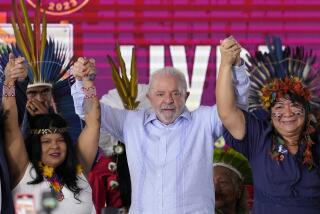Brazil Braces for Referendum on Sarneyâs Record
NEW YORK â When Brazilian President Jose Sarney visits the United States next month, he will have a chance to show Americans how the worldâs eighth-largest economy is doing.
Sarney was thrust into the presidency when veteran politician Tancredo Neves took ill on the eve of his March 15, 1985, inauguration and died 38 days later. Sarney would have been Nevesâ vice president, but instead became the first civilian leader of Brazil after 21 years of military rule.
Although both Neves and Sarney were chosen not by popular vote but by an Electoral College established during the military government, Sarneyâs âNova Republicaâ has been widely supported as a desirable alternative to the corrupt and discredited military regime.
During nearly 18 months in office, Sarney has weathered a major economic crisis, the near dissolution of the political party system and escalating violence in both the cities and the countryside. After an initial period of uncertainty, when critics called for a shortening of his mandate and direct presidential elections, Sarney has emerged as an unexpectedly popular and decisive leader.
Sarneyâs current success in Brazil is largely due to the initial effectiveness of a monetary stabilization measure known as the Plano Cruzado, passed in late February. Similar to stabilization programs enacted by Israel, Argentina and other countries plagued by hyper-inflation, the plan substituted a new currency pegged to the dollar, the cruzado, for the old currency, the cruzeiro. Both wages and prices were frozen, allowing the government to abolish indexation. With the Plano Cruzado in place, the monthly inflation rate dropped to below 1% from a record 15% per month early this year.
The political consensus built around the Plano Cruzado has just recently begun to erode. Excessive consumer spending and worsening shortages, particularly of some staple foodstuffs, prompted the government in late July to pass a new set of fiscal measures designed to force savings and stimulate investment. These include compulsory loans to the government in the form of surcharges on cars, fuel and foreign travel. The loans are intended as revenues for a proposed national development fund. The fund is part of an ambitious development program intended to raise Brazilian living standards to those of Mediterranean Europe and âprepare Brazil to occupy an important position in the 21st Century.â
Critics are cynical and scoff at promises that the compulsory loans will be repaid after three years in the form of shares in the development fund. Even the government admits that in the short term, the measures are intended to finance federal spending and dampen the consumer boom that has threatened the success of the Plano Cruzado.
The effect of the new measures on Sarneyâs popularity will become clearer as the Nov. 15 elections draw closer. The elections are for governors and for federal congressmen who will also serve as delegates to the 1987 Constituent Assembly, where a new constitution will be written. Although direct elections for mayors of state capitals and designated ânational securityâ areas were held in November, 1985, some eight months after Sarney took office, this yearâs contests will be the first real referendum on his presidency. It remains to be seen whether upper- and middle-class voters, who are bearing the brunt of the recent fiscal measures, will vote against the government party, the Brazilian Democratic Movement (PMDB).
In fact, Sarney himself has an uneasy relationship with the PMDB. He is not a long-time member, but switched from the Liberal Front Party (PFL), which had joined with the PMDB in the Democratic Alliance that carried Tancredo Neves to victory.
Now, nearly two years later, all three groupings are in crisis. The PFL--in the words of one commentator--is a set of initials in search of voters. The Democratic Alliance will be on the 1986 ballots in only three relatively unimportant states. The PMDB, once the grand party of the united opposition to the military regime, has never recovered from either its own lack of internal coherence or major defeats suffered in the 1985 mayoral contests. Sarney in effect is a president without a party, and his administration has depended increasingly on direct appeals to the population for support.
This situation shows how difficult it is to establish a democratic system in Brazil. Political parties have been weak and incapable of channeling public opinion into concrete policy outcomes. Political elites, traditionally in control of Brazilian politics, have continued to dominate events. The military, now ostensibly back in the barracks, has maintained an important role in running the state. For example, there have been no trials of security agents accused of human-rights abuses during the military regime. Thanks to a 1979 Brazilian amnesty law that wiped clean the records of both suspected torturers and alleged terrorists, the matter is virtually closed.
By a twist of fate, Sarney, the new leader of a country that is home to some 130 million people, has inherited a staggering array of long-term structural problems. A prominent social scientist estimates that one-third of Brazilian families live on salaries below the minimum wage, currently fixed at about $60 per month. An additional 25% of Brazilian families live on monthly incomes of $60-$120 per month. Malnutrition, high infant mortality rates and endemic diseases are commonplace in some parts of the country. More than 40% of the economically active population does not have access to decent health conditions, basic education, adequate housing, social security or regular employment. These conditions are the root causes of increased urban violence and armed conflicts between landowners and peasants in rural areas, even as the government proposes a plan for agrarian reform.
It is not so much Brazilâs domestic problems but disagreements over trade policies that will occupy Sarney on his U.S. visit in mid-September. Dependent on earnings from exports of textiles, clothing and shoes--among other products--to service its $110-billion foreign debt, the Brazilians have bristled over protectionist measures designed to reduce these imports to the U.S. market. Although President Reagan recently vetoed such a bill, the Administration has threatened Brazil and the major Asian exporting countries with reprisals unless U.S. demands for trade concessions are met.
The Brazilians, for their part, have restricted the activities of foreign computer firms, particularly in the area of microcomputers, to protect the domestic computer industry. The United States appears to have singled out the computer issue as a symbol of Brazilian intransigence in making trade concessions. The Brazilians, despite internal disagreements about the wisdom of the policy, have strongly defended their right to close a segment of the domestic computer market to foreign participation.
Much more than the terms of trade will be at stake in these discussions. Recent economic forecasts have predicted strong growth, controlled inflation and an improved credit rating for Brazil through 1991, provided political stability can be maintained. But Sarneyâs presidency makes it clear that political stability is also dependent on a strong economic performance.
For all its shortcomings, Sarneyâs government has cleared the way for serious debate over how best to manage Brazilâs numerous problems. There is still a long way to go toward democracy, but the transition from military to civilian rule is a good first step. If the United States, despite its lamentable affection for Latin American dictators, is serious about promoting democratic governments in the region, then Brazil deserves full support and understanding, from both U.S. officials and the American public.
More to Read
Sign up for Essential California
The most important California stories and recommendations in your inbox every morning.
You may occasionally receive promotional content from the Los Angeles Times.










